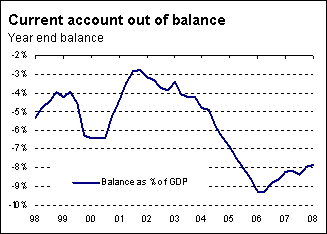Is New Zealand bankrupt?
New Zealand is an indebted nation that persistently runs current account deficits. This raises the questions, what is a current account deficit and should we be concerned about it?
The best way to think of the current account deficit is to relate it to your own spending as a household. When the country is running a current account deficit it is borrowing to fund current spending – just like if you were spending more than you earned then you would have to borrow.
Just like an individual, a nation may spend more than it earns because (as a whole) it wants to consume more now, or because it wants to invest for the future. It appears that the recent increase in our current account deficit is the result of both rising consumption and rising investment.
On the investment side, the idea of borrowing now to fund capital expenditure is a fairly mundane concept. The benefit of an investment project will materialise over time, while a disproportionate portion of the cost is incurred straight away. As long as the benefit of the investment exceeds the cost over the investments lifetime, and the risks are known, then there is no reason to be concerned about this form of borrowing.
An example of how this works for a household is as follows. If you wish to buy an expensive asset (eg a car or, house) you can either save up the funds or you can borrow and pay back the funds overtime. The risk from borrowing is that you have made a commitment to repay the loan, which might become difficult if, say, you lose your job. On the other hand, if you pay for everything out of savings you miss out on all the opportunities – say from having a car today instead of waiting several years.
Over the past five years, the New Zealand dollar has been especially strong, and the world price of capital equipment has been surprisingly low. In this type of situation it makes sense that New Zealand businesses have invested in assets by borrowing – thereby taking advantage of this opportunity while it was available.
Unless we believe that businesses are incapable of making sensible decision regarding their own investment, then there really is no problem with having a current account deficit that funds private investment activity.
On the consumption side, a nation may spend more than it earns because it either anticipates that it will grow in the future or it may substantially favour spending now ahead of spending in the future. As the goal of policy should be to maximise society’s lifetime happiness, if individuals want to consume more now (to the detriment of future consumption opportunities) they should be allowed to.
For a household, this type of borrowing is equivalent to "smoothing" the amount you consume over time. When you are young, you expect your lifetime earnings to increase in the future – as a result it is in your interest to borrow now. As a nation, we expect our lifetime earnings to increase in the future – and as a result, if we are offered credit at attractive rates we will be willing to borrow now.
There is an issue of fairness associated with borrowing to consume; economists term this "intergenerational equity". If you and I borrow now to consume and don’t pay it back in our lifetime, this will create a debt that future generations are burdened with.
But if we expect the economy to continue growing over time and if we value the lifetime happiness of our children as much as ourselves, it may still make sense for households to redistribute income over time in this way – because growth will increase future incomes. As long as we believe that households can borrow sustainably, then there is no problem with a current account deficit stemming from individuals choice of consumption.
The decision to borrow in order to fund consumption and investment has built up a stock of debt in New Zealand that is equivalent to 86% of the countries income (gross domestic product). As a result, a major determinant of our current account deficit each year is the interest payments that head overseas. However, this stock of debt is the result of consumption and investment choices in the past. In a household sense, this is equivalent to paying off the interest on your mortgage or a hire purchase.
The current account deficit is merely the result of the borrowing, consumption, and investment decisions of every household and firm in the economy. As long as these households and firms are fully informed of the risk and return associated with their borrowing decisions, is there really any reason to fear the spectre of a current account deficit? To answer my own rhetorical question – it appears not.





